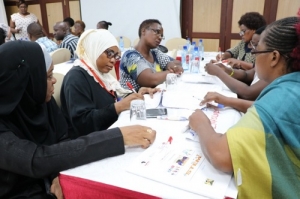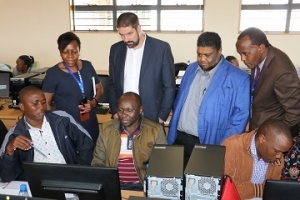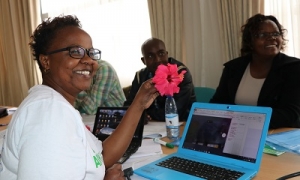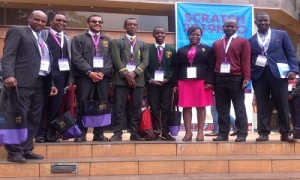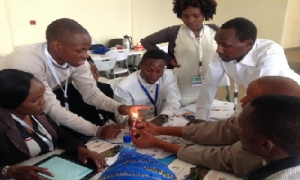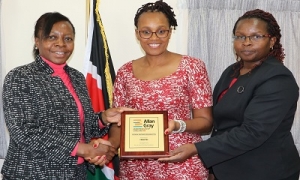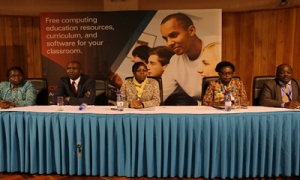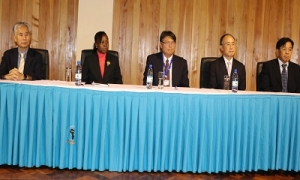Esther Nyambura
CEMASTEA has been conducting professional development of science and mathematics teachers to change their attitudes as well as those of their students. The professional development is also conducted to shift the teaching from teacher-centered to learner-centered pedagogies. While there is commendable success in this direction, there is little empirical evidence of how the professional development initiatives affect the pedagogies that the teachers employ in their classrooms.
This impact analysis study used trained research assistants drawn from a pool of Quality Assurance and Standards Officers (QASOs) with a Science and Mathematics background to follow 40 carefully sampled teachers who had undertaken training through CEMASTEA involving Inquiry-based learning (IBL) and 5E instructional Model strategies. The teachers together with 811 of their students were selected from eight counties.
The following are findings of this research
Changes in the student’s attitudes in science and mathematics. The students hold a positive attitude towards science and Mathematics that measured 3.82 on a scale of 1-5. This attitude is not uniform for all subjects and seems to have greatly changed in favour of Physics.
Leaner-centeredness of lessons. The students reported that for every two weeks 71% of their lessons were leaner-centred. For example, in chemistry, 6.5 out of 8 lessons offered in two weeks had hands-on activities for students.
High pedagogical knowledge but lower content knowledge: 45% of the content in the lesson observed had tasks designed at the low “confirmatory” level of inquiry and another 42.5% at “structured” level of inquiry. Teachers rarely made changes in the material as presented in the course books. This may be due to low content mastery, it was noted that when in class, 53.1% of the teachers operated at higher levels of inquiry (i.e., “guided and “open” inquiry) often characterised by open-ended questions that extended learners engagement. This means that the development of pedagogical knowledge is good but there were gaps in the development of content knowledge.
Besides, the study showed that the teachers’ practice was affected by the following issues
- Inadequate infrastructure including laboratory space and equipment, and ICT infrastructure
- Low morale especially due to lack of support by the school administration as well as strenuous workloads
- Syllabus coverage with emphasis is on the pace of coverage at the expense of quality teaching. Principals did not support teaching for conceptual learning and understanding.
- Entry characteristics of learners are deteriorating, and in many ways becoming more diverse. There are also more students with special needs. It is increasingly becoming necessary to differentiate instructions on this basis.
Recommendations
- Leverage on ICT to extend professional development beyond the INSET workshop, to reach more teachers at a time, improve communities of practice among the teachers, host and share exemplar practices on an accessible cloud platform.
- Increase frequency and length of contact with teachers to adequately inculcate a modern teaching philosophy as well as increase uptake of new pedagogies.
- Efforts should focus teachers on improving Content mastery by focusing teachers on designing alternative activities.
- There is an increasing need to integrate strategies for learners with Special needs
- More research: How does fast-tracking content coverage affects learning outcomes? What is the extent of diversity in the current classes? What is the impact of the current efforts in integrating ICT?
The study recommends that to curb the dynamic variations in the students’ attitudes in mathematics and science, CEMASTEA should consider ways they can encourage interdisciplinary collaborations. The rigidity to textbooks that limits the teacher’s ability to design suitable tasks can be mitigated through encouraging creative and exciting explorations such as those in the CEMASTEAs training manuals. The students also recommend that CEMASTEA tries to train teachers as close as possible to the opening day for schools to allow them to practice what they have learned while it is still fresh in their minds.
The career fair commonly themed as ‘Careers for the Future’ is an annual event by myNETWORK with the purpose to motivate ambitious young people with the thirst for more information to improve their careers. This year’s event was held from January 17 – 18, 2020.
About 35 institutions of higher learning exhibited at the event showcasing different opportunities they have for learning as far as careers and opportunities are concerned.
Group photo from STEM participants comprising the mentors and the mentees
Various guests graced the event as speakers and to offer motivation and guidance to the young people, among them was Nation Media Group CEO Mr. Stephen Gitagama who officially opened the event, Mr. Caleb Karuga - the Founder and CEO of Wendy Farms, Roy Gitahi - CEO Art at work Limited, Ms. Celestine Olilo - Editor at MyNetwork Magazine and Sports, Journalist, Mr. Robert Mutahi - Creative Director Urban Designs Studios, Ms. Roselyne Kigen -Founder, International parenting for a better life, Ms. Jane Muiruri - Hr practitioner, Ms. Velma Amondi – the Distribution Manager at IBM, Ms. Njeri Mburu and Mr. David Nyakaru who are both national trainers at the Centre for Mathematics, Science and Technology Education in Africa (CEMASTEA).
Mr. Gitagama encouraged the young entrepreneurs to cease sitting back and feign unemployment, instead, they should learn to be self initiators and take the bull by its horns.
Nation Media Group CEO, Mr. Stephen Gitagama during his opening remarks
Themed discussions on matters focusing on Creative Arts and Sports, Entrepreneurship, Manufacturing and STEM (Science, Technology Engineering and Mathematics) were also carried out and participants sat in the tent whose theme best suited them and had a chance to interact with their mentors and ask questions where necessary.
The Centre for Mathematics Science and Technology Education in Africa (CEMASTEA) was greatly represented by Madam Njeri Mburu and Mr. David Nyakaru.
Madam Njeri Mburu, national trainer at CEMASTEA speaking to the participants of STEM during the mentorship programme
In the current era, technology is everything and an individual who is tech-savvy can drive the business to succeed. Madam Njeri emphasised on the need to be unique, creative and innovative of which CEMASTEA is passionate about with its mandate on offering Teacher Professional Development (TPD) to Science and Mathematics teachers.
She mentioned that the youths should be teachable and the knowledge gained to be used to create more job opportunities for themselves and for others. She reiterated that the behaviour of aping what others are doing should be replaced with being creative thinkers and by doing so the young people will be able to address problems in life head-on using technology.
In addition, Mr. Nyakaru stated that the world out there is full of opportunities waiting to be discovered and it can only be achieved through being real and doing everything practically.
He brought to their understanding the aspect of being both a consumer and a presumer which can only be met by the creation of forums to enhance matters concerning technology.
Mr. David Nyakaru, national trainer at CEMASTEA speaking to the participants of STEM during the mentorship programme
Article written by: Dan Orero, Winfred Magu and Patrick Wanjohi
Photos by: Dan Orero, Winfred Magu and Patrick Wanjohi
Centre for Mathematics, Science and Technology Education (CEMASTEA) whose mandate is to provide Teacher Professional Development (CPD) has partnered with Education Development Trust to train upper-grade primary school teachers of mathematics and science from selected schools in Kenya on Gender-responsive pedagogy; Activity-based learning and improvisation in Science, Technology, Engineering, and Mathematics (STEM) Education.
The training affirms the role of both institutions in encouraging gender balance and equality in STEM fields. The training will lay a foundation for the implementation of the ‘Quality Gender-responsive STEM education’ course for primary school teachers. This is to be achieved by:
- Equipping teachers with skills to deliver activity-oriented teaching that is gender-responsive and aligned to the Competency-Based Curriculum Framework.
- Sustaining reflective practices among STEM teachers
- Creating communities of practice in schools and clusters.
THEME: Towards developing a quality gender-responsive STEM education through learner-centered teaching and learning practices
SPECIFIC OBJECTIVES:
- Enhance teachers’ understanding of factors that influence boys’ and girls’ participation, learning achievement and continuation in STEM education, and the current situation in respective counties.
- Develop participants’ capacity to foster gender-responsiveness among learners, along with the knowledge and skills needed to advance the quality of, and gender-responsive STEM education.
- Enhance teachers’ skills in learner-centered teaching methods.
- Enhance peer support among trainers for effective delivery of school-based INSET.
VENUES: The training will be offered in six different venues namely: Mombasa, Kilifi, Kwale, Turkana, Tana River and Isiolo.
DATES OF THE TRAINING: 18th- 22nd November 2019
#QualityGenderResponsiveSTEMEducation
Turkana County
One hundred and twenty teachers of maths and science drawn from three sub-counties are undertaking the week-long training on Quality Gender-Responsive STEM Education and some of the units include STEM Education in Kenya, Introduction to CBC in Kenya, Gender and STEM Education, Active Learning Strategies, Gender-Responsive Pedagogy, Gender- Responsive Teaching and Learning Resources for STEM Education Promoting Professional Learning Communities through School-Based Lesson Study and Bridging Theory to Implement Pedagogy
While speaking to participants during the opening ceremony on Quality Gender-Responsive STEM Education course for primary school teachers the Chief Guest Mr. Langat Cheruiyot TSC- CD Turkana County, affirmed one of the main roles that teachers play in impacting the lives of learners’ and improving the lives of members of the society. Mr. Cheruiyot reminded them that STEM is an enabler to realize Vision 2030 and this can only be achieved through concerted efforts to build the capacity of teachers in STEM subjects. He mentioned that in Turkana County, various schools had been identified to serve as INSET centres and STEM Model Schools which have been equipped and a number of their teachers have been trained by CEMASTEA.
In addition, he lauded the inclusion of Primary Schools in SMASE programme which was earlier targeting maths and science teachers’ in secondary schools. “Bringing on board the primary schools shows continual improvement” Mr. Cheruiyot noted.
He further challenged the participants’ to continually improve themselves and compared the various educational systems such as the 7.6.3, 8-4-4 and now Competency-Based Curriculum (CBC) that is being implemented. The other systems have been phased out due to the changing needs of the society, and now CBC has incorporated STEM to cater to these changes. The Chief Guest applauded CEMASTEA and Education Development Trust for organizing capacity building programmes for teachers.

Mr. Langat Cheruiyot, TSC- CD Turkana County speaking to the participants’ during the opening ceremony in Turkana
Ms. Jane Rose Tioko, Principal Education Officer urged the participants’ to cascade the skills and knowledge acquired to their various schools. She encouraged them to work as a team so that we see an improvement in the performance of mathematics and science subjects. Madam Tioko, appreciated the efforts and impact of EDT programmes in Turkana County as this was evident in the good examination results from the schools they have partnered with.

Ms. Jane Rose Tioko, Principal Education Officer Turkana County making her remarks during the opening ceremony
Mr. Thomas Opiyo Regional Coordinator Education Development Trust welcomed the participants’ from the three (3) sub-counties and shared the midline report. He stated that good results had been realised in Early Grade Mathematics Assessment (EGMA) for classes 5, 6 and 7 and that the region had ranked position 1 out of eight (8) regions. In Samoa Early Grade Assessment (SEGRA), Mr. Opiyo noted that Difference in Difference (DID) between comparison and intervention schools ranked four out of eight with a mean of 3.6 which was fairly good. In addition, enhanced instructional competencies were realised among fifty-two primary school teachers trained by CEMASTEA. Finally, there was notable progress among the twenty-four, Heads of Department in learner-centred approaches in their schools.

Mr. Thomas Opiyo, Regional Coordinator Education Development Trust, Turkana County making his remarks during the opening ceremony
Activities
Participants drawn from the three sub-counties namely; Turkana South, Loima and Turkana East engaged in various activities that involved group discussions, gallery walks and SWAP-STAT in order to deepen their knowledge on two sessions which are STEM Education in Kenya and Introduction to Competency-Based Curriculum in Kenya.

Participants discussing SWAP-STAT in their various sub-counties


Participants taking a gallery walk showing a representation of gender balance on Science and Mathematics in their various clusters


Participants’ pairing and sharing to discuss ideas during the training


Mr. Ogwel Ateng, National Trainer, CEMASTEA facilitating the session on STEM education in Kenya


Mr. John Odhiambo, National Trainer, CEMASTEA taking participants through a session on Introduction to Competency-Based Curriculum (CBC) in Kenya

A participant preparing and presenting a group report on components of CBC education
TANA RIVER COUNTY
The participants are teachers drawn from three sub counties each having several clusters as follows;
- Tana North Sub County. Clusters include; Walesorea, Chewele, Madogo , Hirimani, Nanighi
- Tana River Sub County. Clusters include ; Galole central , Galole East , Galole West, Galole South, Galole North
- Tana Delta Sub County. Clusters include; Chara, Garsen, Kipini , Kofira, Tarasaa, Ozi
One hundred and ten teachers are undertaking the training
Opening ceremony
The opening ceremony was graced by the Tana River TSC County Director Mr. Aneriko Maloba and his deputy Dr. William Yator. Mr. Phillip Maate, the team leader introduced the team of facilitators from the Centre for Mathematics, Science and Technology Education in Africa (CEMASTEA). Mr. Karanja, a senior coach from Education Development Trust (EDT) introduced the participants by their clusters and invited Mr. Newton Mwashemu, EDT to make a brief remarks.
While making his remarks, the Chief Guest, Mr. Aneriko Maloba TSC County Director, Tana River urged the participants to cascade the training in their schools. He stated that it was a privilege for the teachers to be selected to attend such capacity building forums. He encouraged the teachers that in addition to syllabus coverage, they ensure that learning takes place and the learner is able to acquire required competencies. He emphasized that teachers need to create an environment where learning actually takes place and should only play a facilitator’s role. He finalized by reminding the teachers on the importance of lesson observation as it serves to improve teaching and learning at the classroom level and concluded by declaring the training officially opened.
Chief Guest, Mr. Aneriko Maloba TSC County Director, Tana River addressing the participants and officiating the opening of the training
The deputy TSC County Director Dr. William Yator On his part, appreciated the Education Development Trust for organizing the workshop in partnership with CEMASTEA for facilitating the training. He observed the similarity between CEMASTEA’s ASEI-PDSI approach and Competency Based Curriculum towards enhancing learner centered pedagogy. He also stated that the impact of the training should be reflected in the performance of the schools where the participating teachers are drawn from. “We will monitor to ensure the performance improves”, he stressed

Chief Guest, Mr. Aneriko Maloba TSC County Director, Tana River addressing the participants and officiating the opening of the training

Dr. William Yator, Deputy TSC County Director, Tana River addressing the participants
Mr. Newton Mwashemu, Education Development Trust addressing the participants
Activities

Mr. Phillip Maate, National Trainer, CEMASTEA facilitating a session on STEM Education in Kenya


Participants engaging in a SWAP -STAT activity during a session on STEM Education in Kenya

Participants engaging in a gallery walk activity


Madam Rahab Chiira, National Trainer, CEMASTEA facilitating a session on Competency-Based Curriculum in Kenya
Mombasa County
Opening Ceremony
The Quality Gender-Responsive STEM Education Training course taking place from 18th - 22nd November 2019 in Mombasa, Kilifi, Kwale, Turkana, Tana River and Isiolo counties is aimed at developing quality gender-responsive STEM education through learner-centered teaching and learning practices.

A section of the participants during the opening ceremony of the Quality Gender-Responsive STEM Education Training course in Mombasa city
Speaking during the opening ceremony of the chief guest, TSC-CD Mombasa represented by the Ms. Mishi Ali the TSC Curriculum Support Officer, Tononoka sub-county encouraged the participants to understand the individual learner’s needs and help them grow. She informed them to use ICT tools to help expose the learners’ and be committed to improving learning outcomes through reflective teaching. She lauded Education Development Trust (EDT) and the Centre for Mathematics, Science and Technology Education in Africa (CEMASTEA) for organising the training.

Mrs. Mishi Ali, CSO - Tononoka representing the County Director TSC during the opening ceremony
The other speakers emphasized the importance of competency Based Curriculum around STEM education
On her part, Ms. Mwanaisha Abdul, CSO Changamwe sub-county appreciated the participants for attending the training and mentioned the effort teachers are putting towards the available programmes to become a better team by enhancing, developing themselves and acquiring more skills as they implement Mathematics and Science. She encouraged them to take the programme positively, be more innovative and be able to implement and help the learners become better in Science and Mathematics.

Madam Mwanaisha Abdul, CSO Changamwe sub-county while making her remarks during the opening ceremony of the Quality Gender-Responsive STEM Education training course
Mrs. Sichangi lauded Education Development Trust (EDT) for partnering with the Centre for Mathematics, Science and Technology Education in Africa (CEMASTEA) to continue building the capacity of teachers. She encouraged the participants to focus and tap the best of out of the one week course and in turn help the learners.
She promised them more support as they go through the training and prepare for the implementation. She said that even as the girls’ are empowered, we need to take the issues of boys’ and champion them to greater heights of learning STEM areas.

Mrs. Mary Sichangi, Head, Partnerships and Linkages, CEMASTEA making her remarks during the opening ceremony in Mombasa
Ms. Regina, the EDT regional coordinator, Coast appreciated the quality work that CEMASTEA was doing and appreciated the partnership arrangement. She thanked the TSC for allowing them to organize the training, appreciated the participants and emphasizing that there cannot be transition from one level to another without retaining girls’ in schools.
She echoed that the only thing that will change the destiny of the girls’ is education and the teaching profession must play a big role to ensure that happens. She assured the participants of the EDT support in ensuring the success of the training.

Ms. Regina Kisilu, the EDT regional coordinator Coast making her remarks during the opening ceremony
The participants later indulged in discussing the importance of STEM education and the current efforts to realise Kenya’s development goals and United Nations Sustainable Development goals (SDGs).


Mr. Daniel Matiri, National trainer, CEMASTEA taking the participants through a session
SWAP-STAT
The objective of the activity was to familiarise the participants with key data related to girls’ and boys’ in STEM education as well as examine participants’ own level of familiarity about girls’ and boys’ education and STEM-based careers.

Participants engaged in the SWAP-STAT activity during the training
World Café/Knowledge Café
Participants worked in groups to discuss with individuals switching tables periodically and getting introduced to the previous discussion at the "host table".
Gallery walk on the county situation
The activity enables the participants to understand the gender-related situation in STEM education in participating clusters, as shared by participants.

Participants going through the Gallery Walk and analysing data on the county situation
The participants also delved into discussing the need for curriculum reform and some reasons that led to change from 8.4.4 to the Competence-Based Curriculum.

Mr. Martin Mungai, national trainer, CEMASTEA taking the participants through the curriculum reforms

A participant presenting some of the reasons that led to change in the Curriculum
Mr. Ollie Bray, Director LEGO Foundation & Initiatives Lead, accompanied by Mr. Abdul Rahim and Mr. Alex Magu Managing Director, Program Director at Play Point Education Play Point Education paid a courtesy call to the Director CEMASTEA, Mrs. Jacinta L. Akatsa, HSC. Key issues discussed during the meeting included; collaboration in early learning, creative play and tinkering, scaling up partnership in creative coding and LEGO Robotics.
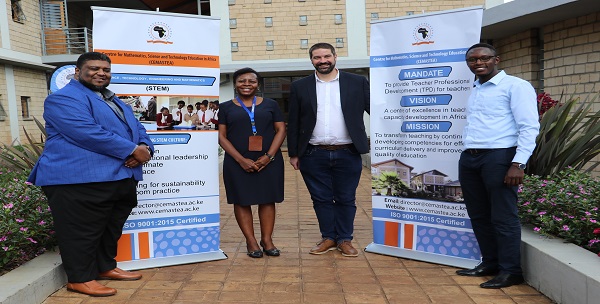
Mr. Abdul Rahim, Managing Director Play Point Education (left), Mrs. Jacinta L. Akatsa, HSC, Director CEMASTEA (2nd left), Mr. Ollie Bray, Director LEGO Foundation and Initiatives Lead (2nd right) and Mr. Alex Magu, Program Director Play Point Education (right) pose for a picture following the visit
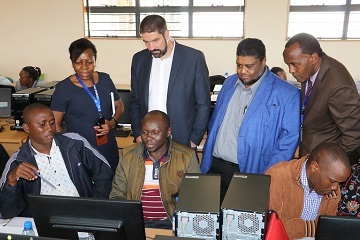
A participant explains to Mrs. Akatsa, Mr. Bray, Mr. Abdul and Mr. Kiruja how they are using ICT integration in teaching and learning of science during the tour of CEMASTEA facilities
The LEGO Foundation is part of the LEGO Group which aims to build a future in which learning through play empowers children to become creative and engaged lifelong learners.
The Government of Kenya has partnered with the World Bank (WB) to improve student learning and transition from upper primary to secondary education in targeted areas. This objective will be achieved through the implementation of the “Secondary Education Quality Improvement Project (SEQIP) which aims to “improve student learning and transition from Primary to Secondary Education in targeted areas. The project beneficiaries are about 600,000 pupils in upper primary and 600,000 students in secondary from 17,500 and 8,500 primary and secondary schools respectively.
The schools are located in 110 sub-counties from 30 counties that are educationally and economically challenged including those in Arid and Semi-Arid Land (ASAL), urban slums and regions with pockets of poverty. SEQIP has four components namely; improving quality of teaching; improving retention in upper primary and transition from primary to secondary schools. The components will be implemented by the Ministry of Education (MoE), Teachers Service Commission (TSC) and other agencies.
TSC will work through CEMASTEA given its mandate to provide Teacher Professional Development (TPD) to implement the School-Based Teacher Support System (SBTSS) subcomponent of component one on improving the quality of teaching. SBTSS will entail a smart cascade of training where National trainers will train and support County trainers or facilitators during the training of teachers at the cluster level in the targeted counties. A pilot training of facilitators or County trainers was conducted for Makueni, Machakos and Kajiado counties before being rolled out to other targeted counties This training of facilitators/trainers drew teachers of Mathematics and Science from both the Primary and Secondary sections who will in turn cascade the training in their various counties.
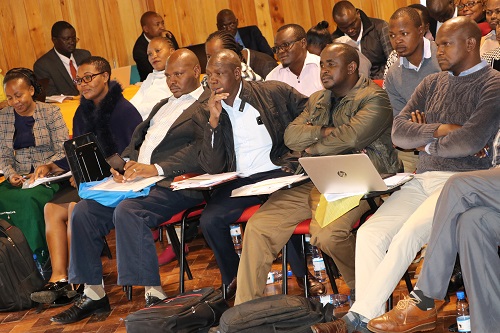
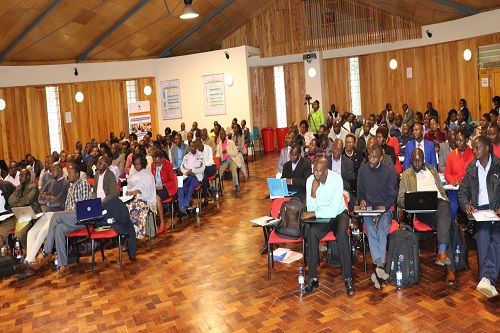
A section of the participants during the Trainers’ Training Programme of SEQIP at CEMASTEA during the Opening Ceremony
The theme of the training was “Enhancing student learning through the use of Effective Learner Centred Teaching and Learning Strategies”.
Speaking during the inaugural launch of the three-day training that ran from October 17-19, 2019 at CEMASTEA, Mr. Ezekiel Tumbo, Assistant Director Quality Assurance and Standards Officer at the Teachers Service Commission (TSC) representing the C.E.O TSC lauded the institution for being a home of quality in continuously developing teachers. He mentioned that the teaching profession in Kenya has made a milestone by adopting teaching standards including:
- Professionalism - Code of Conduct, Education Act, Constitution and Etiquette
- Pedagogical Content Knowledge and ability to implement CBC – it also emphasize digital literacy
- Assessment for learning to improve outcome.
- Inclusive Education Practice – all the learners must be given equal opportunity to learn
- Comprehensive school health and safety – guide learners on healthy eating habits
- Financial LiteracyInstructional Leadership
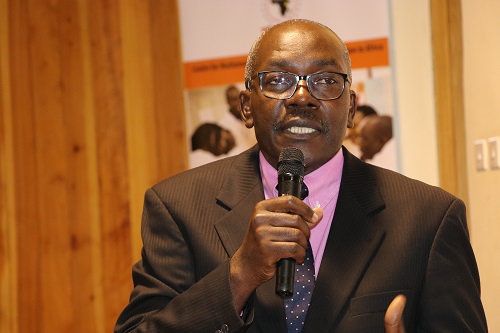
Mr. Ezekiel Tumbo, Assistant Director Quality Assurance and Standards Officer, TSC
On her part, Dr. Catherine Warui, Assistant Director Quality Assurance and Standards Officer at the TSC and the focal person for SEQIP while speaking to the participants appreciated them for taking the pilot project seriously, emphasised on the use of Technology by the teachers in teaching and learning. She challenged them to be the champions during the rollout of the project.
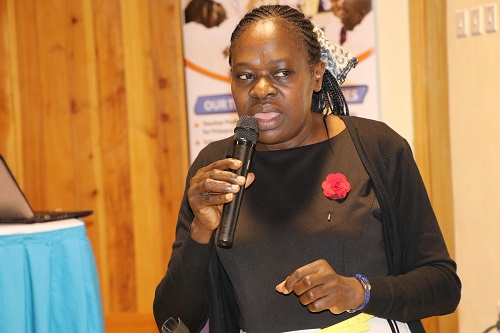
Dr. Catherine Warui, Assistant Director Quality Assurance and Standards Officer at the TSC and the focal person for SEQIP
Mrs. Lydia Muriithi, Deputy Director CEMASTEA represented the Director in welcoming the participants for the three day training and stated the importance of utilising knowledge and skills learnt for the Kenyan child. She stated that the training offers an opportunity for the teachers to sharpen their skills and encouraged them to be committed to the worthy course of piloting the project and cascading it to the rest of the teachers.
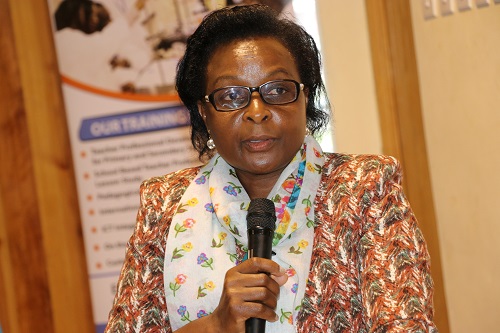
Mrs. Lydia Muriithi, Deputy Director CEMASTEA
While speaking, Mr. Patrick Kogolla, the Coordinator of Training Programmes at CEMASTEA appreciated the participants for attending the training and encouraged them to participate fully in the three day training.
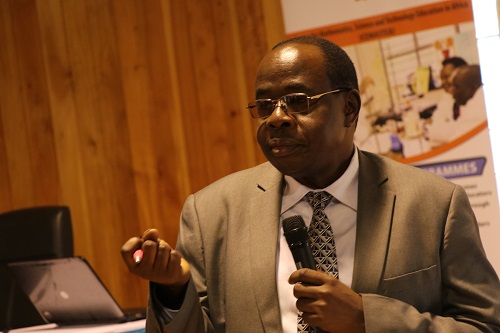
Mr. Patrick Kogolla, Coordinator of training programmes, CEMASTEA
Mr. George Kiruja, Coordinator Primary Training Programme and focal person on SEQIP at CEMASTEA lauded the significant roles the World Bank, MoE, TSC and CEMASTEA, were playing in making the project a success. He explained that upon completion of the training, participants were expected to demonstrate their understanding on: School Based Teacher Support System (SBTSS); Prevailing pedagogical and content knowledge gaps and effective teaching and learning strategies
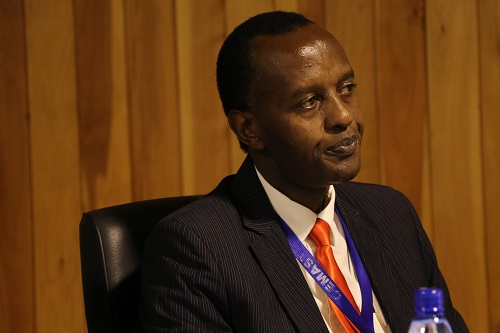
Mr. George Kiruja, Coordinator Primary Training Programme and the focal person on SEQIP at CEMASTEA
Subject Sessions
Participants were engaged in discussing issues and possible strategies to address the challenges in teaching and learning. They proceeded to design Inquiry-Based Learning (IBL) activities in the digital and non-digital form to help in teaching concepts.
During the subject sessions participants of Science and Mathematics from both the Primary and Secondary sections assembled in different subject groups where they discussed issues and possible strategies addressing the challenges in teaching and learning in their respective schools.
In addition, they designed Inquiry-Based Learning (IBL) activities in digital/non-digital formats to teach concepts, critiqued and developed lesson plans incorporating IBL.
Secondary
Biology
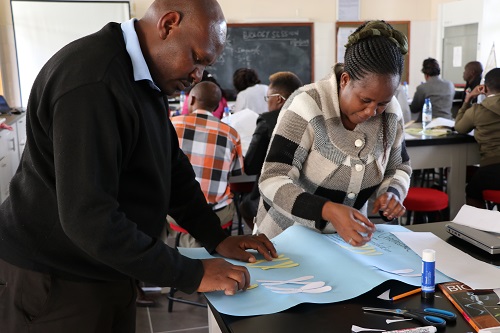
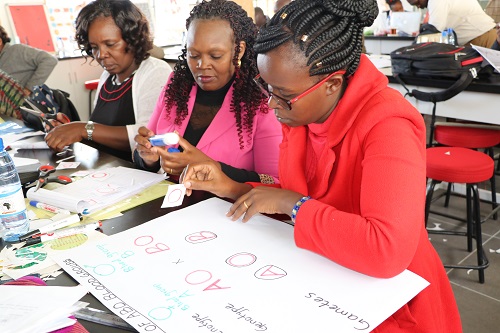
Trainers’ in Biology education designing Inquiry-Based Learning (IBL) activities in digital and non-digital formats in teaching concepts during the SEQIP training at CEMASTEA
Chemisrty
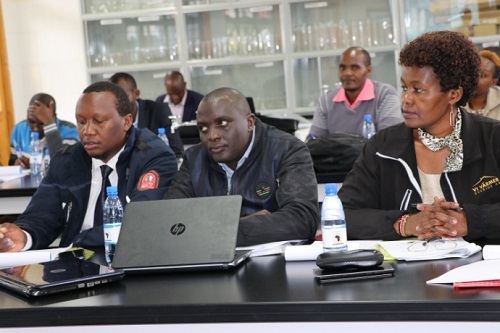
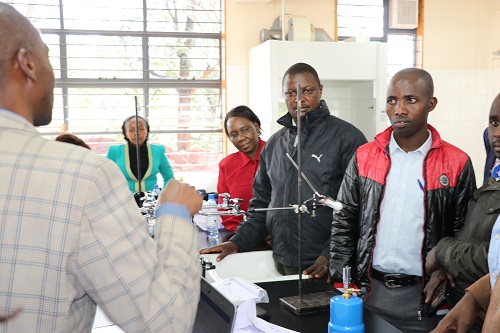
Trainers’ in Chemistry education designed Inquiry-Based Learning (IBL) activities in digital and non-digital formats in teaching concepts during the SEQIP training at CEMASTEA
Physics
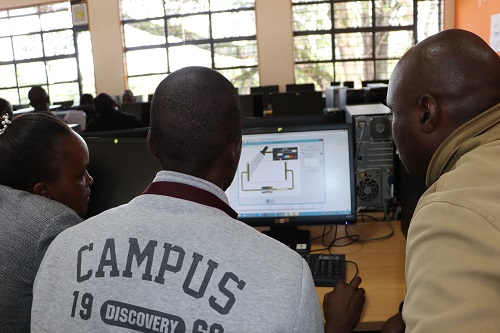
Trainers’ in Physics education designing Inquiry-Based Learning (IBL) activities in digital and non-digital formats in teaching concepts during the SEQIP training at CEMASTEA
Mathematics
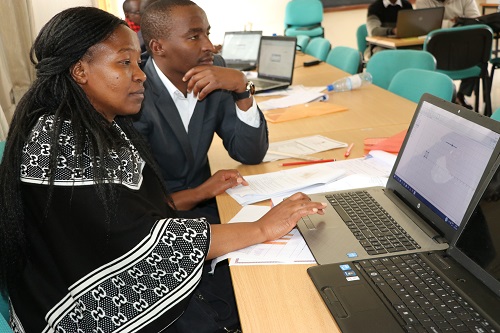
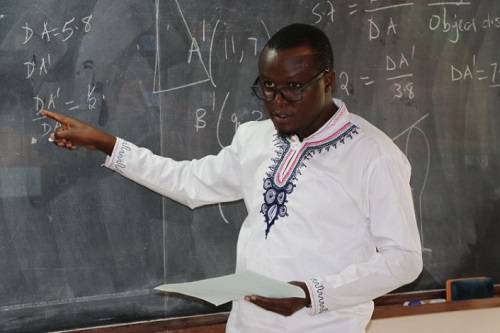
Trainers’ in mathematics education designing Inquiry-Based Learning (IBL) activities in digital and non-digital formats in teaching concepts during the SEQIP training at CEMASTEA
Primary Science
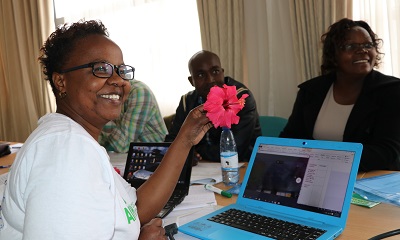
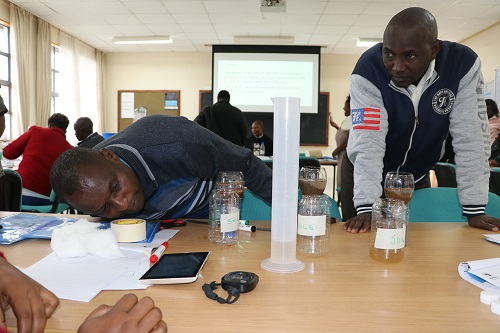
Trainers in Science education designing Inquiry-Based Learning (IBL) activities in digital and non-digital formats in teaching concepts during the SEQIP training at CEMASTEA
Primary Mathematics
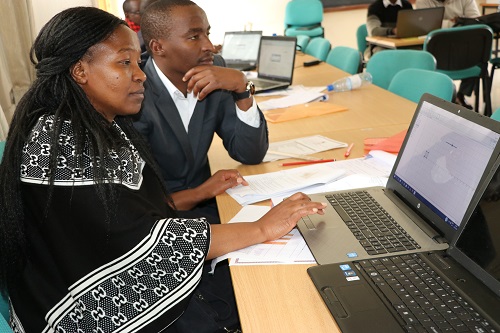
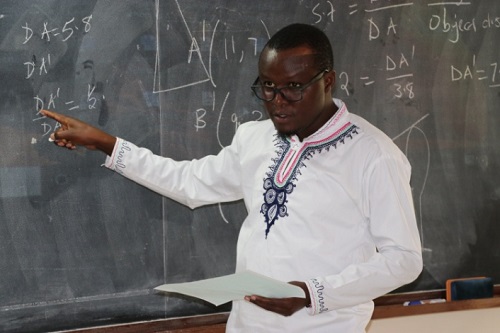
Trainers in Mathematics education designing Inquiry-Based Learning (IBL) activities in digital and non-digital formats in teaching concepts during the SEQIP training at CEMASTEA
CEMASTEA when giving the way forward to the participants mentioned that an action planning is done to ensure that the practice is sustained in their various schools.
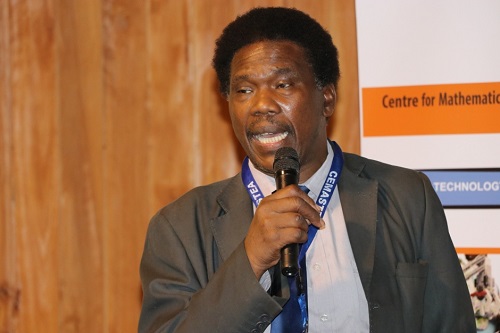
Mr. Joseph Mathenge, Coordinator Field Services, CEMASTEA
Closing Ceremony
The three-day training on School-Based Teacher Support System (SBTSS) drew 109 participants from Makueni, Kajiado and Machakos counties. The participants were equipped with the requisite knowledge and skills to help in smart cascade as trainers of teachers at the cluster level and practitioners at the school level.
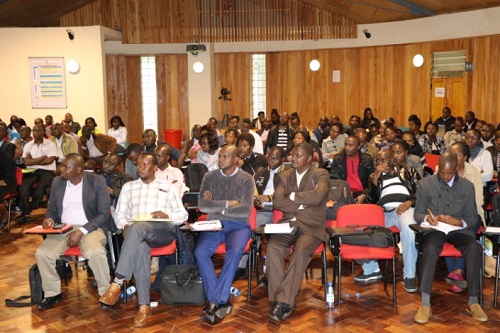
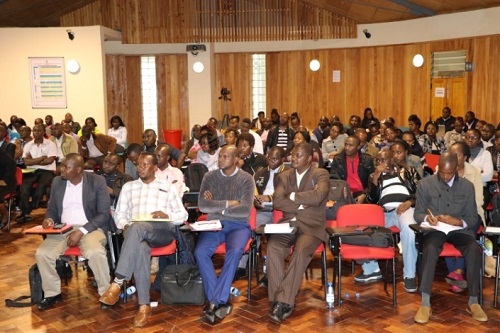
A section of the participants during the Trainers’ Training Programme of SEQIP closing ceremony at CEMASTEA
Mr. David Kirui, Deputy Director Quality Assurance and Standards, Ministry of Education (MoE), Department of Early Learning and Basic Education representing Ag. Director Directorate of Project Delivery and Coordination Ministry of Education (MoE), Department of Early Learning and Basic Education who was the chief guest during the closing ceremony told the participants that the activities they were involved in for the three days would impact positively on leaners in their various schools to help the learners improve.
He advised them to support one another to have an impact in the classroom delivery. Mr. Kirui emphasised that the success of the project will be realised on how well the cascade will be done and the impact it will have.
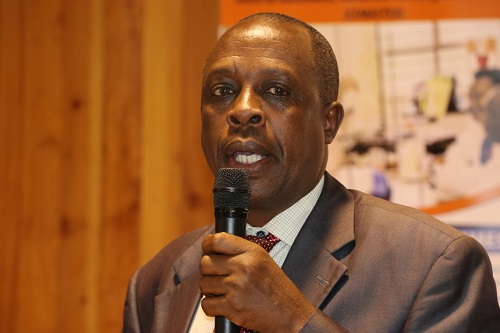
Mr. David Kirui, Deputy Director Quality Assurance and Standards, MoE Department of Early Learning and Basic Education
While speaking to the participants, Mrs. Jacinta L. Akatsa – HSC, Director CEMASTEA congratulated them for working towards serving Kenyan child. “Let it not be business as usual,” said Mrs. Akatsa. She encouraged them to touch the learners’ lives positively.
She emphasised on the need to be more creative and re-engineer teaching to create quality in teaching and learning.
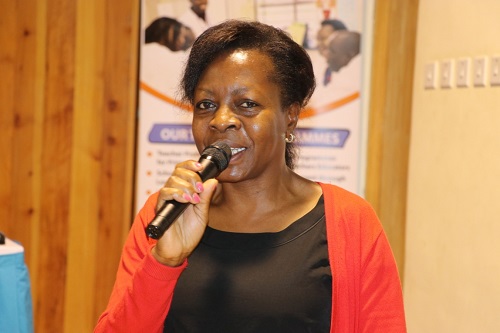
Mrs. Jacinta Akatsa, HSC Director CEMASTEA
Mr. Geoffrey Etyang, Assistant Director Quality Assurance and Standards, TSC who is the focal person on School-Based Teacher Support System (SBTSS) informed the participants of the SEQIP mantra which is “Quality Education, Quality Life” and urged them to be the ambassadors as they implement what they have learnt in the training as it will also form part of the Competency-Based Curriculum (CBC).
He challenged them to improve on the mode of lesson delivery having acquired the necessary knowledge and skills. Mr. Etyang encouraged the participants to be the agents of change. He mentioned three components of SEQIP that includes reducing teacher shortage in schools, Teacher Professional Development (TPD) and Modular School-Based TPD.
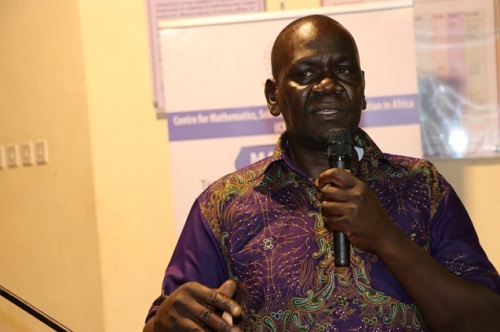
Mr. Geoffrey Etyang, Assistant Director Quality Assurance and Standards Officer, TSC
On the other hand, Professor Hellen Inyega, Senior Education Consultant for World Bank while speaking to the participants encouraged them to form a community of practice and informed them that having been equipped will be the game-changers in education.
“We have confidence in you that you are going to implement,” stated Professor Inyega. She expressed her excitement by the level of commitment of the participants for their quest on the content and pedagogical knowledge.
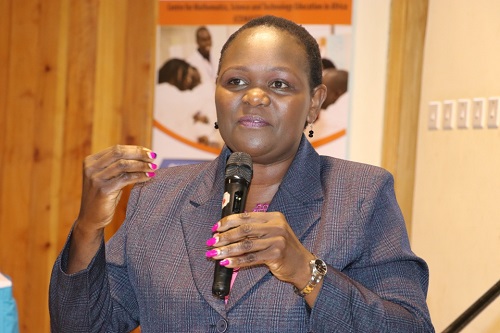
Professor Hellen Inyega, Senior Education Consultant for World Bank
Mr. Patrick Kogolla, Coordinator Training Programmes at CEMASTEA on his part appreciated the participants for their endurance. He mentioned that they have learnt as teachers and they have a task to help other teachers and the learners to also benefit from the same and apply it in teaching and learning.
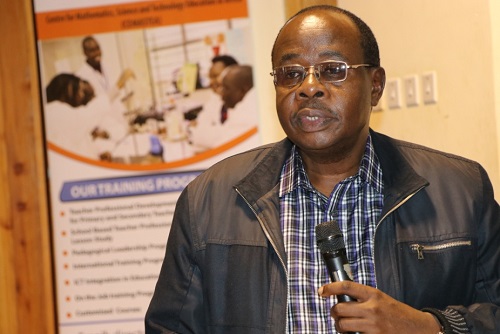
Mr. Patrick Kogolla, Coordinator Training Programme, CEMASTEA
Mr. George Kiruja, Coordinator Primary Training Programme and the focal person on SEQIP at CEMASTEA advised the participants to adhere to the action plan they came up with and assured them of the support. He mentioned that the whole purpose of the training was to enhance learner-friendly engagement in teaching and learning.
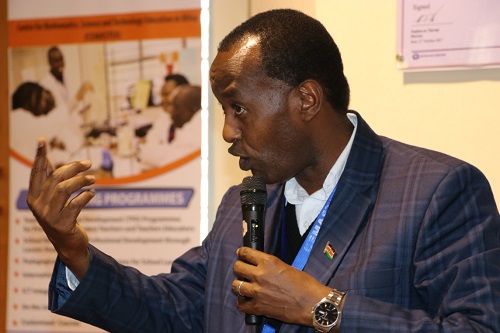
Mr. George Kiruja, Coordinator Primary Training Programme and the focal person on SEQIP at CEMASTEA
Story and photos by: Ann Mumbi
Theme of the Conference: Waves in Innovation.
The first ever SCRATCH Africa Global Conference 2019 (SCRATCH2019NBO) held in Africa from 16th-18th October 2019 at Brookhouse-Karen Campus brought along educators from all over the world to share lessons, empower young people and celebrate accomplishments in creative coding.
Mrs Jacinta Akatsa, HSC, Director CEMASTEA was the key note speaker on Thursday the 17th. In her speech on Mainstreaming STEM in the classroom she reiterated that CEMASTEA is cognizant of the role of the teacher in unpacking and demystifying STEM subjects in basic schooling as a key determinant in enhancing innovation and creativity among the young learners.
She was also an all-female panelist in discussions along mainstreaming STEM in the classroom.
Director giving her speech
Madam Akatsa encouraging Jamhuri Boys when she visited their stand
The Centre for Mathematics, Science and Technology Education in Africa (CEMASTEA) whose mandate is Teacher Professional Development in Mathematics and Science Education (TPD-MSE) partnered with Education Development Trust to train teachers of upper primary grades on Quality Gender-responsive Science, Technology, Engineering, and Mathematics (STEM) Education.
The training drew participants from eight counties namely; Mombasa, Isiolo, Nairobi, Tana River, Kwale, Marsabit, Kilifi and Turkana. The training was held in five venues in Kwale, Hola, Lodwar, Nairobi, and Isiolo towns.
The week-long training aimed at strengthening the capacity of both boys’ and girls’ in Science and Mathematics by equipping teachers with relevant knowledge and skills necessary to enhance the learners’ interest and participation in STEM related subjects. The focus was on minimizing gender disparity in STEM.
Speaking to the participants who attended the Gender- Responsive STEM Education Training in Mombasa County, Mrs. Jacinta Akatsa- HSC Director, CEMASTEA urged the participants to find solutions to end some cultural practices that are prohibiting girls from continuing with their education such as early marriages. “We need to empower both boys and girls so that they can contribute to their communities,'' she added. She mentioned that by changing the narrative of discontinuation of girls education would lead to enrolment of equal number of learners in schools and institutions of higher learning.
Mrs. Jacinta Akatsa, Director, CEMASTEA speaking to the participants during the Gender- Responsive STEM Education Training in Mombasa County
She affirmed that the training would provide them with a chance to have a paradigm shift in teaching and learning that can only be achieved through gender responsiveness, STEM education and adoption of Curriculum Based Competency.
Mrs. Jacinta Akatsa - HSC Director - CEMASTEA listening to Mr. Thuo Karanja National Trainer and a participant while taking a gallery walk on the activities participants engaged in during the Gender-Responsive STEM Education Training in Mombasa County
The training adopted a theory-to-practice approach to explore relevant issues and employed a mixture of interactive pedagogy to build on participants’ skills. Participants delved into various learning components through learner centred activities. These were achieved by think- pair-share group work, presentations, videos, gallery walks, world café and school field visits.
Hither to that, Mrs. Lydia Muriithi the Deputy Director CEMASTEA while speaking to participants in Isiolo County echoed the great role teachers play in bettering the learners. She encouraged them to implement the knowledge and skills gained.
Mrs. Lydia Muriithi the deputy Director, CEMASTEA speaking to the participants during the opening ceremony – Isiolo County
The Regional Coordinators, Education Development Trust Mr. Dalana Jarso, Isiolo County (Left) Madam Regina Ndunge Mombasa Region (middle) and Mr. William Njuguna (left) making their remarks during the opening ceremony of the Primary Teacher Training Course on Quality Gender-Responsive STEM, in Isiolo, Mombasa and Nairobi Counties respectively
Mrs. Mary Sichangi, Coordinator Partnership Linkages and International Training, CEMASTEA speaking to the participants during the opening ceremony in Mombasa
Mr. Aten’g Ogwel National Trainer, facilitating a session in Isiolo County
Mr. Thuo Karanja (Left) and Mr. Simon Mugo (Right) National Trainers, CEMASTEA facilitating sessions in Mombasa County
Madam. Amina Sharbaidi(Left) Madam Njeri Mburu (Middle, Mr. Martin Mungai (Left) National Trainers, CEMASTEA facilitating sessions in Nairobi County
Mr. Philip Maate, National Trainer, facilitating a session in Turkana County
Mr. John Odhiambo, (Left) and Mr. Francis Kamau (Right) National Trainers, facilitating sessions in Tana River County
Hands on Activities participants engaged in
About 360 participants were taken through the week-long training
Roselyn Marandu, Programme Director Allan and Gill Gray Foundation-Kenya (centre) presenting appreciation award to Mrs. Jacinta Akatsa-HSC, Director CEMASTEA (left) and Mrs. Mary Sichangi (right), Coordinator Partnerships and International Trainings, CEMASTEA
A contract to train teachers from the 102 secondary schools had earlier been signed and the training took place in February, 2019 at Nakuru, Nairobi and Mombasa counties whose objective was to induct teachers on the entrepreneurship challenge program for students which they are overseeing in schools as students engage in the online based competitions.
After a successful implementation, some students from Science, Technology, Engineering and Mathematics (STEM) model schools qualified for the awards. The award ceremony that was held on 3 August 2019 was presided over by Mrs. Lydia Muriithi, deputy director CEMASTEA presenting the Institution on behalf of the Director.
Mrs. Jacinta Akatsa-HSC, Director CEMASTEA (centre) and Mrs. Mary Sichangi (left), Coordinator Partnerships and International Trainings, CEMASTEA listening to Dr. Roselyn Marandu, Programme Director Allan and Gill Gray Foundation-Kenya (right) during a courtesy call to present an appreciation award to CEMASTEA
Dr. Marandu presented the appreciation award to the director CEMASTEA in the company of Mrs. Mary Sichangi, Coordinator Partnerships and International Trainings.
Mrs. Jacinta Akatsa, HSC – Director CEMASTEA while speaking to the participants during the opening ceremony encouraged them to critically look at the content when it comes to training and harmonise activities geared towards coding. She urged them to be willing to participate in the change process to effect the Big Four Agenda and Vision 2030.
Mrs. Jacinta Akatsa, HSC – Director CEMASTEA while speaking to the participants during the opening ceremony
While speaking to the participants, Mr. Daniel Juma, CEO Global Peace Foundation – Kenya emphasised that utilisation of ICT would help solve the problems facing the world today.
Mr. Daniel Juma, CEO Global Peace Foundation – Kenya speaking during the opening ceremony
On his part, Mr. Paul Waibochi- ICT Coordinator CEMASTEA stated that the training would develop the participants’ ICT skills.
Mr. Paul Waibochi- ICT Coordinator CEMASTEA
Group Photo: Mrs. Mary Sichangi (extreme left) Coordinator PL&IT, Mr. Daniel Juma, CEO, Global Peace Foundation- Kenya, Mrs. Jacinta Akatsa (middle) Director, CEMASTEA, Mrs. Lydia Murithii, Deputy Director, CEMASTEA and Mr. Paul Waibochi, ICT Coordinator, CEMASTEA
The Centre for Mathematics, Science and Technology Education in Africa (CEMASTEA) has been charged with the responsibility of implementing the pilot Collaborative Lesson Research (CLR) which is a model of Lesson study whose purpose is to address teaching and learning challenges by a group of teachers using research based approach in three primary schools in Nairobi, Machakos and Kajiado counties.
The aim of the inaugural workshop is to train mathematics and science teachers from the schools on this model of lesson study. The one-week training is on from August 19-23, 2019 at CEMASTEA.
The official opening of the workshop was presided over by Mrs. Jacinta Akatsa- HSC, Director CEMASTEA who lauded JICA for the immense human and material investment it has given the institution. She reiterated that as a result of such collaborations, CEMASTEA has increased its national and international visibility. Mrs. Akatsa further called upon the ‘pilot’ schools and CEMASTEA to maximise the opportunity to ensure the success of the project which will be implemented countrywide.
The workshop is being conducted by lesson study experts from Japan led by Dr. AkihikoTakahashi, a lead researcher on Collaborative Lesson Research (CLR). CLR is a model of lesson study whose purpose is to address teaching and learning challenges by a group of teachers using a research approach.
Mrs Jacinta Akatsa- HSC, Director CEMASTEA speaking to participants during the opening ceremony
Dr. AkihikoTakahashi, a lead researcher on Collaborative Lesson Research (CLR) facilitating a session
Mr. Makoba Kizito, Dean Biology Department CEMASTEA giving his remarks during the opening ceremony
During the week long training, participants’ will be taken through
- Issues in mathematics and science teaching and learning
- Establishing lesson research theme
- Deep examination of teaching and learning materials
- Lesson Designing
Closing Ceremony
While speaking to the participants during the closing ceremony of the week-long training on Collaborative Lesson Research (CLR) Model of Lesson Study at CEMASTEA led by Dr. AkihikoTakahashi, a lead researcher from Japan. Mrs. Jacinta Akatsa Director CEMASTEA advised the participants to take it up upon themselves to not only reach out the learners but also to their colleagues as they play the advocacy role in lesson study. She further encouraged them to have confidence in sharing what they have been trained on.
Mrs. Jacinta Akatsa Director CEMASTEA speaking to the participants during the closing ceremony of the week-long training on Collaborative Lesson Research (CLR) Model of Lesson Study
She appreciated the Government of Japan through Japan International Corporation Agency (JICA) for the support and training on Collaborative Lesson Research (CLR) Model of Lesson Study.
On his part, Dr. Akihiko Takahashi stated to the participants that; “every single moment is one life, one chance” and equated it to every single lesson to the learner being a chance and it should be conducted extra-ordinarily.
Dr. Akihiko Takahashi, lead researcher speaking to the participants during the closing ceremony of the week-long training on Collaborative Lesson Research (CLR) Model of Lesson Study
He encouraged the participants to collaborate, communicate, learn and challenge themselves for the learners to have a better future.
Participants engaged in various activities


